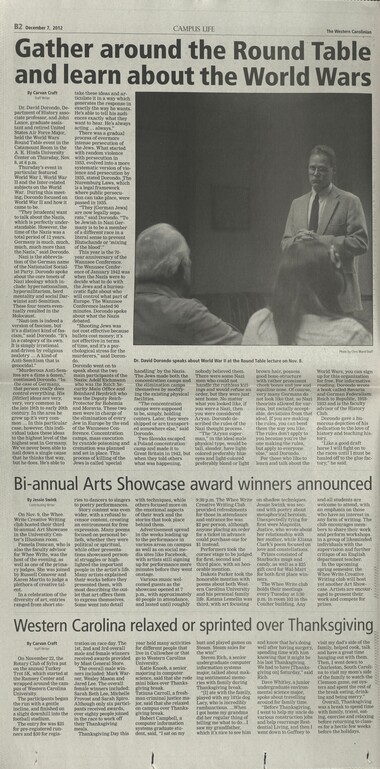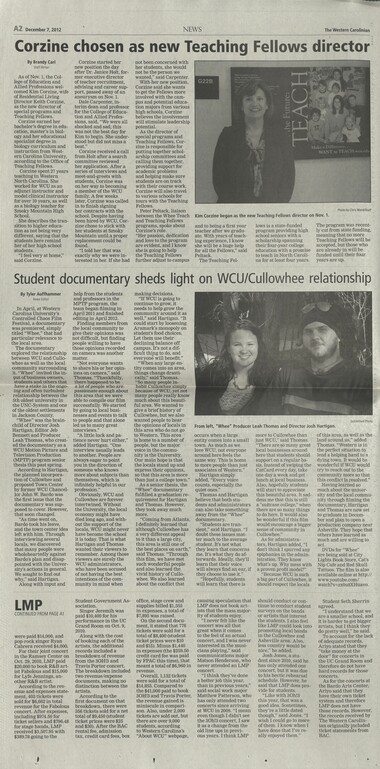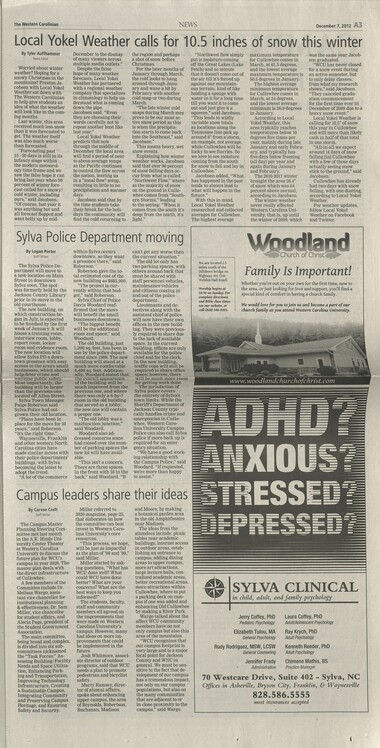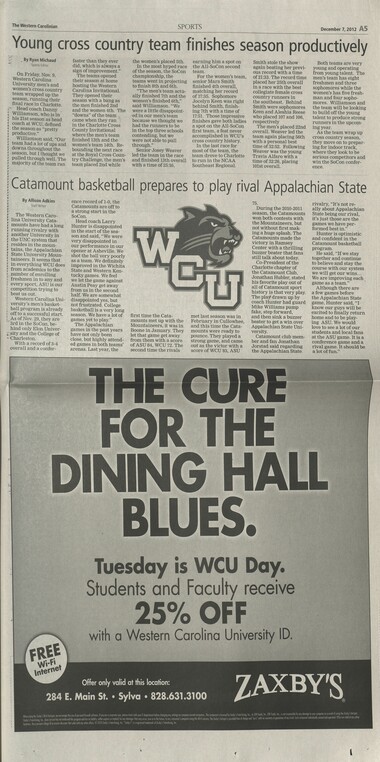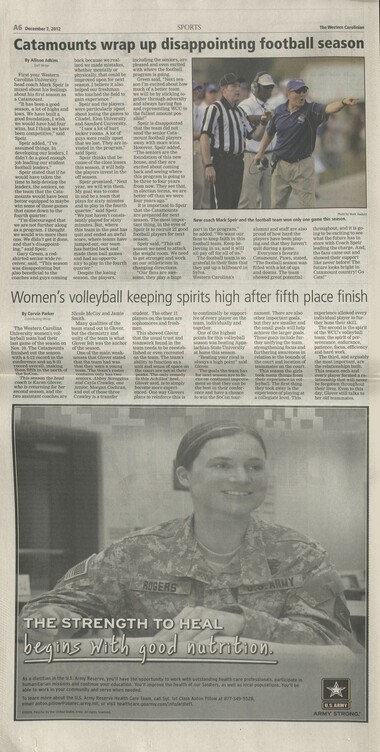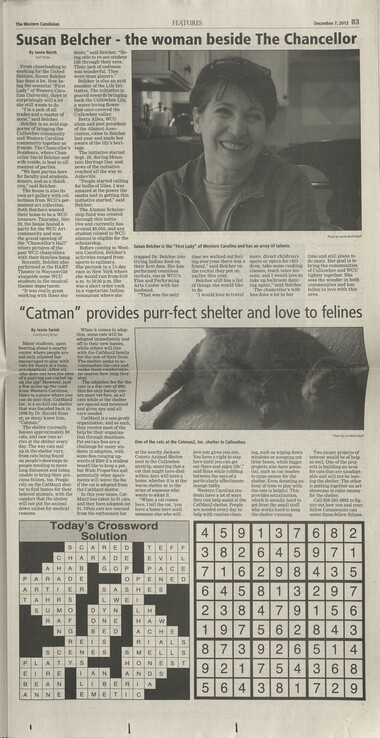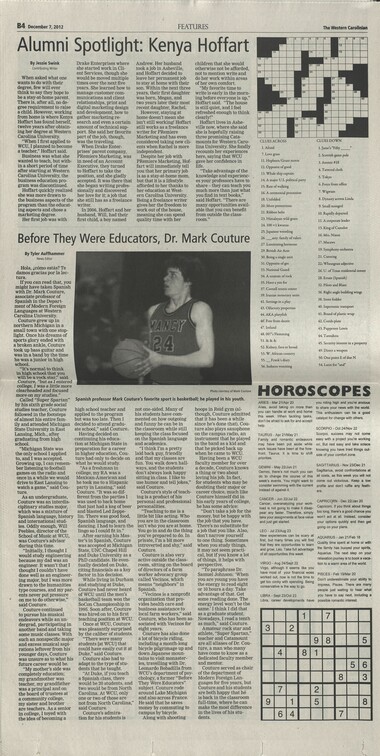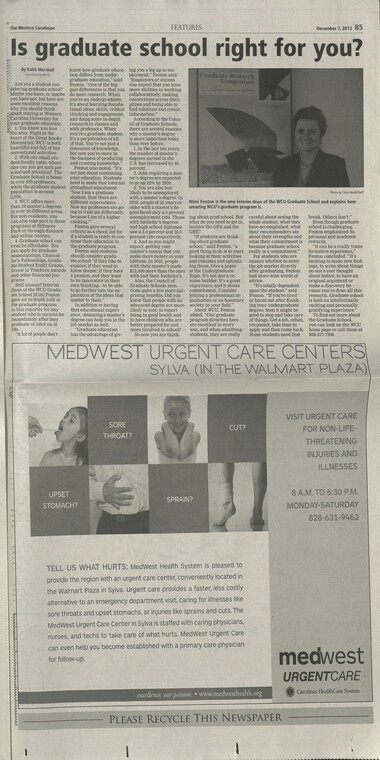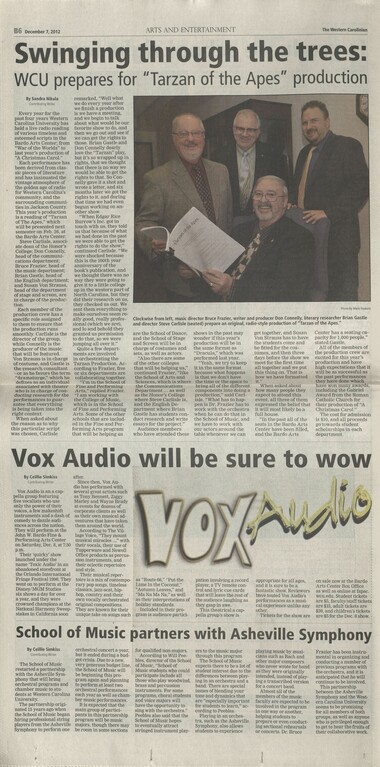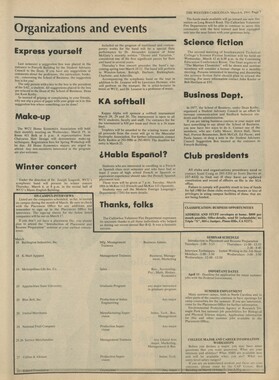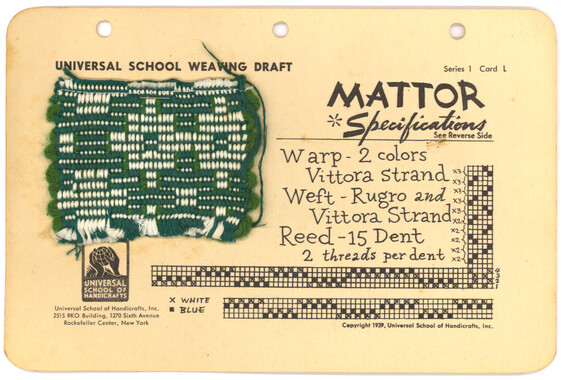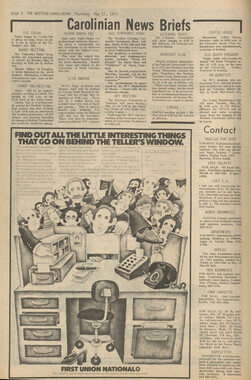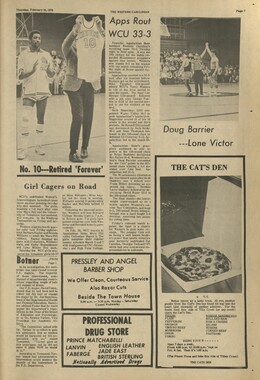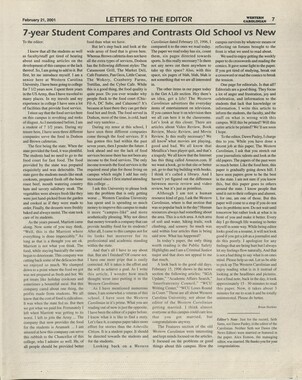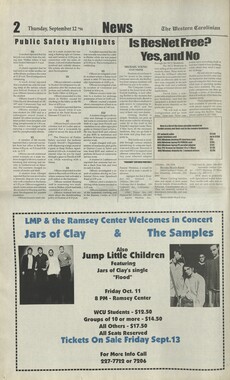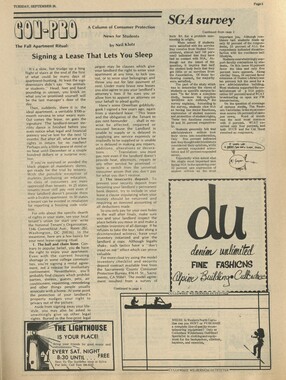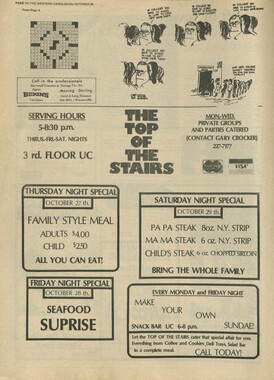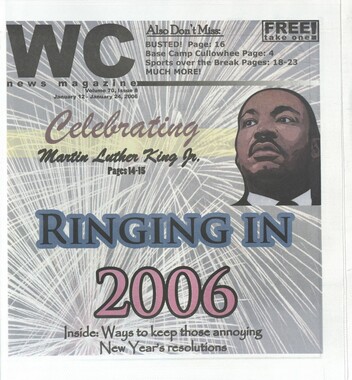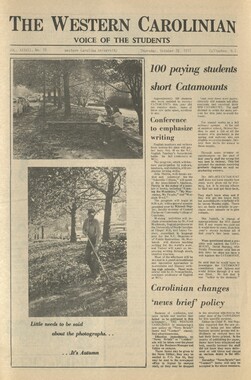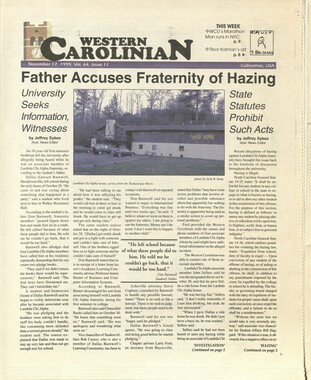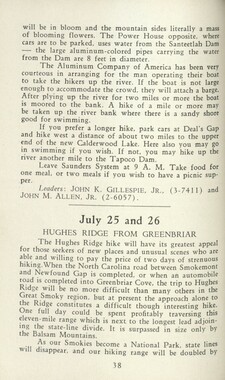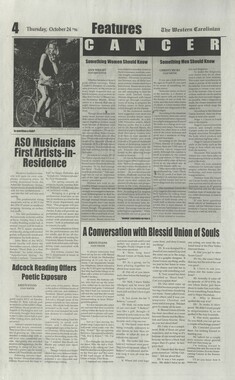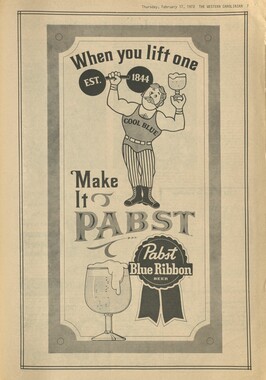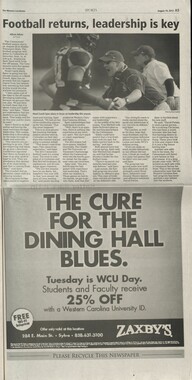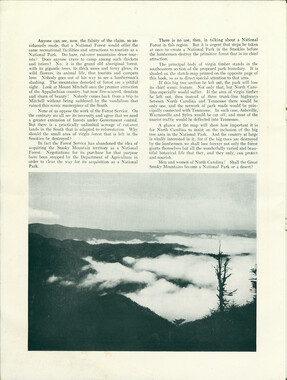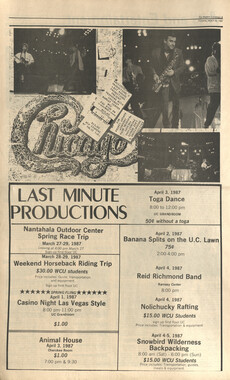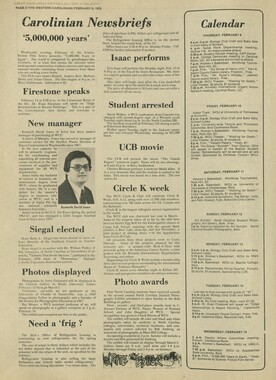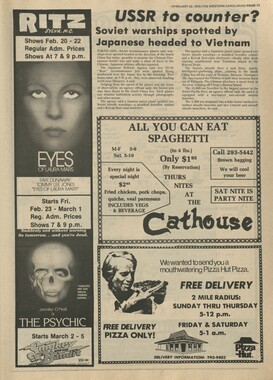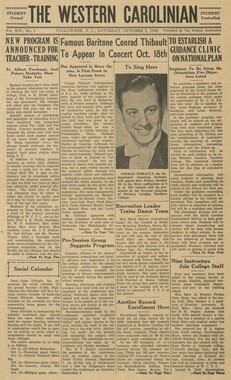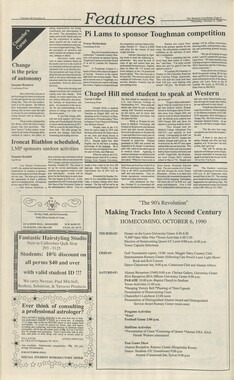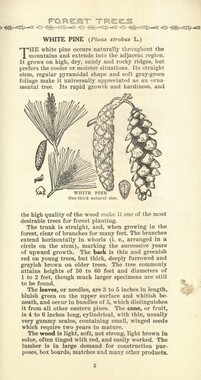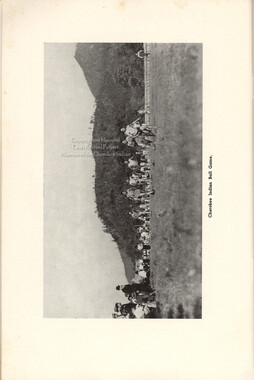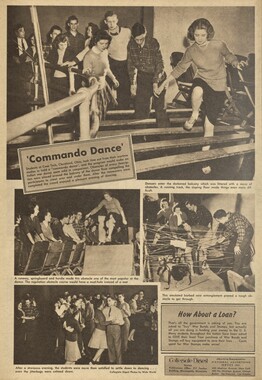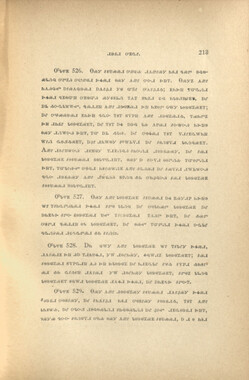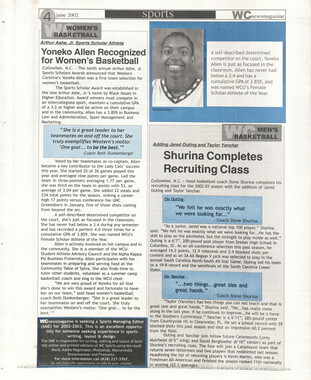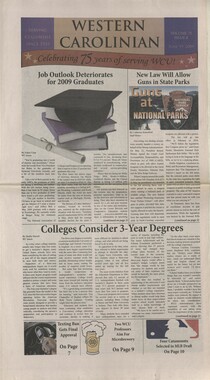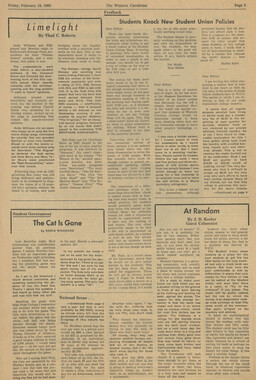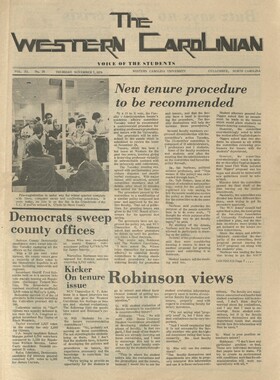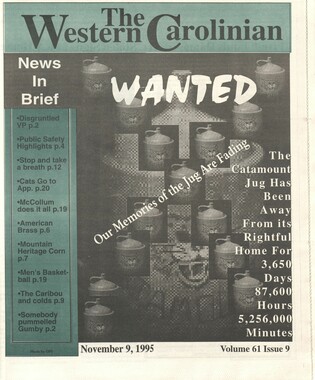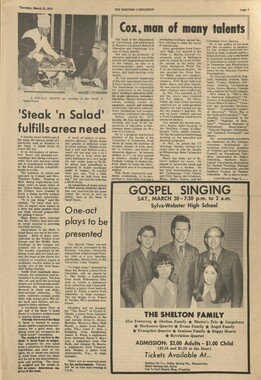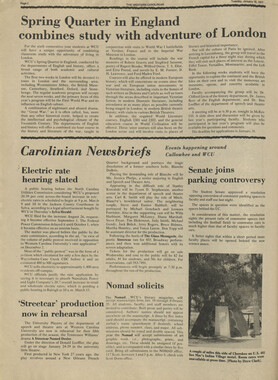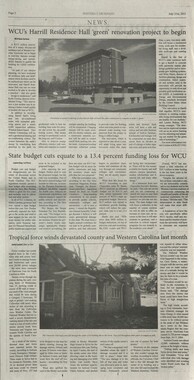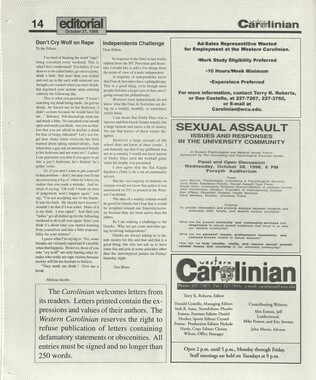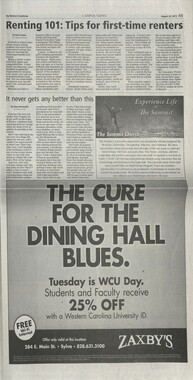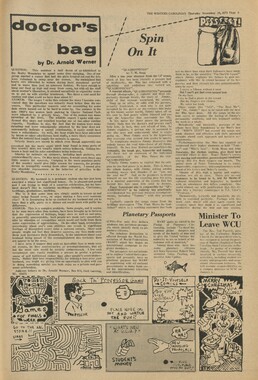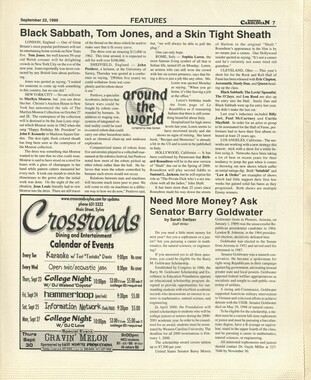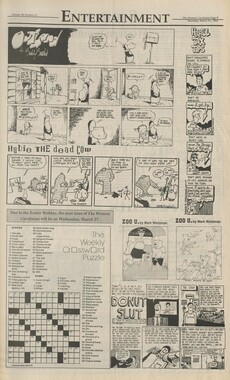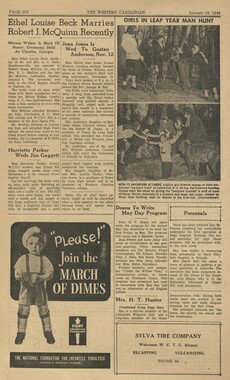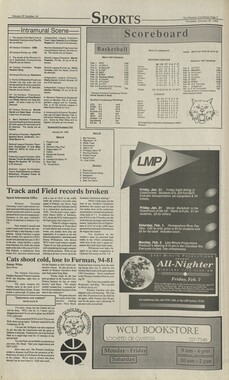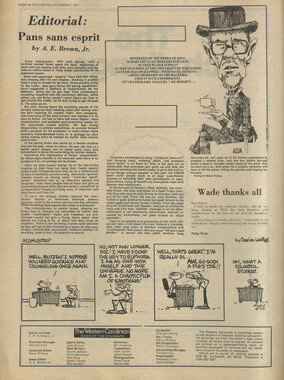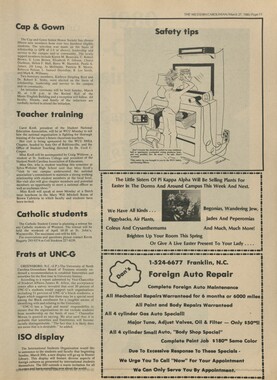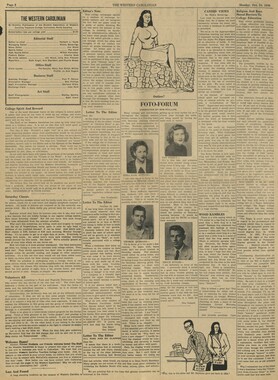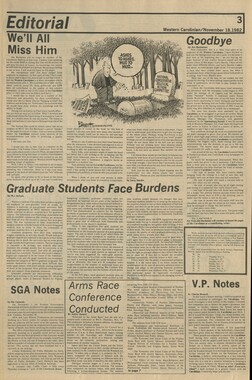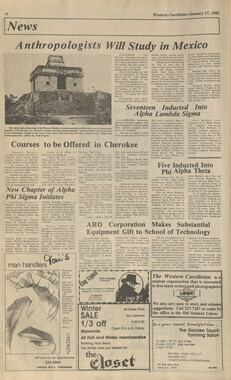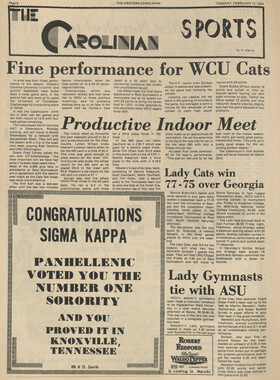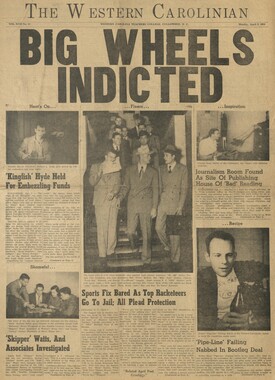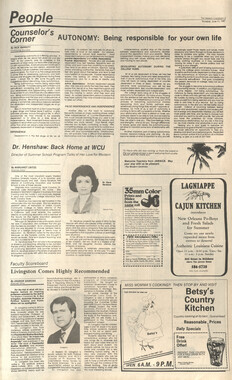Western Carolina University (21)
View all
- Canton Champion Fibre Company (2308)
- Cherokee Traditions (291)
- Civil War in Southern Appalachia (165)
- Craft Revival (1942)
- George Masa Collection (137)
- Great Smoky Mountains - A Park for America (2900)
- Highlights from Western Carolina University (422)
- Horace Kephart (941)
- Journeys Through Jackson (159)
- LGBTQIA+ Archive of Jackson County (85)
- Oral Histories of Western North Carolina (314)
- Picturing Appalachia (6797)
- Stories of Mountain Folk (413)
- Travel Western North Carolina (153)
- Western Carolina University Fine Art Museum Vitreograph Collection (129)
- Western Carolina University Herbarium (92)
- Western Carolina University: Making Memories (738)
- Western Carolina University Publications (2491)
- Western Carolina University Restricted Electronic Theses and Dissertations (146)
- Western North Carolina Regional Maps (71)
- World War II in Southern Appalachia (131)
University of North Carolina Asheville (6)
View all
- Allanstand Cottage Industries (62)
- Appalachian National Park Association (53)
- Bennett, Kelly, 1890-1974 (1463)
- Berry, Walter (76)
- Brasstown Carvers (40)
- Carver, George Washington, 1864?-1943 (26)
- Cathey, Joseph, 1803-1874 (1)
- Champion Fibre Company (233)
- Champion Paper and Fibre Company (297)
- Cherokee Indian Fair Association (16)
- Cherokee Language Program (22)
- Crowe, Amanda (40)
- Edmonston, Thomas Benton, 1842-1907 (7)
- Ensley, A. L. (Abraham Lincoln), 1865-1948 (275)
- Fromer, Irving Rhodes, 1913-1994 (70)
- George Butz (BFS 1907) (46)
- Goodrich, Frances Louisa (120)
- Grant, George Alexander, 1891-1964 (96)
- Heard, Marian Gladys (60)
- Kephart, Calvin, 1883-1969 (15)
- Kephart, Horace, 1862-1931 (313)
- Kephart, Laura, 1862-1954 (39)
- Laney, Gideon Thomas, 1889-1976 (439)
- Masa, George, 1881-1933 (61)
- McElhinney, William Julian, 1896-1953 (44)
- Niggli, Josephina, 1910-1983 (10)
- North Carolina Park Commission (105)
- Osborne, Kezia Stradley (9)
- Owens, Samuel Robert, 1918-1995 (11)
- Penland Weavers and Potters (36)
- Roberts, Vivienne (15)
- Roth, Albert, 1890-1974 (142)
- Schenck, Carl Alwin, 1868-1955 (1)
- Sherrill's Photography Studio (2565)
- Southern Highland Handicraft Guild (127)
- Southern Highlanders, Inc. (71)
- Stalcup, Jesse Bryson (46)
- Stearns, I. K. (213)
- Thompson, James Edward, 1880-1976 (226)
- United States. Indian Arts and Crafts Board (130)
- USFS (683)
- Vance, Zebulon Baird, 1830-1894 (1)
- Weaver, Zebulon, 1872-1948 (58)
- Western Carolina College (230)
- Western Carolina Teachers College (282)
- Western Carolina University (2008)
- Western Carolina University. Mountain Heritage Center (18)
- Whitman, Walt, 1819-1892 (10)
- Wilburn, Hiram Coleman, 1880-1967 (73)
- Williams, Isadora (3)
- Cain, Doreyl Ammons (0)
- Crittenden, Lorraine (0)
- Rhodes, Judy (0)
- Smith, Edward Clark (0)
- Appalachian Region, Southern (2929)
- Asheville (N.C.) (1944)
- Avery County (N.C.) (26)
- Blount County (Tenn.) (195)
- Buncombe County (N.C.) (1680)
- Cherokee County (N.C.) (283)
- Clay County (N.C.) (556)
- Graham County (N.C.) (238)
- Great Smoky Mountains National Park (N.C. and Tenn.) (525)
- Haywood County (N.C.) (3571)
- Henderson County (N.C.) (70)
- Jackson County (N.C.) (4917)
- Knox County (Tenn.) (35)
- Knoxville (Tenn.) (13)
- Lake Santeetlah (N.C.) (10)
- Macon County (N.C.) (420)
- Madison County (N.C.) (216)
- McDowell County (N.C.) (39)
- Mitchell County (N.C.) (135)
- Polk County (N.C.) (35)
- Qualla Boundary (982)
- Rutherford County (N.C.) (78)
- Swain County (N.C.) (2185)
- Transylvania County (N.C.) (270)
- Watauga County (N.C.) (12)
- Waynesville (N.C.) (86)
- Yancey County (N.C.) (72)
- Aerial Photographs (3)
- Aerial Views (60)
- Albums (books) (4)
- Articles (1)
- Artifacts (object Genre) (228)
- Bibliographies (1)
- Biography (general Genre) (2)
- Cards (information Artifacts) (38)
- Clippings (information Artifacts) (191)
- Copybooks (instructional Materials) (3)
- Crafts (art Genres) (622)
- Depictions (visual Works) (21)
- Design Drawings (1)
- Drawings (visual Works) (185)
- Envelopes (73)
- Exhibitions (events) (1)
- Facsimiles (reproductions) (1)
- Fiction (general Genre) (4)
- Financial Records (12)
- Fliers (printed Matter) (67)
- Glass Plate Negatives (381)
- Guidebooks (2)
- Internegatives (10)
- Interviews (815)
- Land Surveys (102)
- Letters (correspondence) (1013)
- Manuscripts (documents) (618)
- Maps (documents) (177)
- Memorandums (25)
- Minutes (administrative Records) (59)
- Negatives (photographs) (6090)
- Newsletters (1290)
- Newspapers (2)
- Notebooks (8)
- Occupation Currency (1)
- Paintings (visual Works) (1)
- Pen And Ink Drawings (1)
- Periodicals (193)
- Personal Narratives (10)
- Photographs (12976)
- Plans (maps) (1)
- Poetry (5)
- Portraits (4568)
- Postcards (329)
- Programs (documents) (181)
- Publications (documents) (2443)
- Questionnaires (65)
- Relief Prints (26)
- Sayings (literary Genre) (1)
- Scrapbooks (282)
- Sheet Music (2)
- Slides (photographs) (402)
- Songs (musical Compositions) (2)
- Sound Recordings (796)
- Specimens (92)
- Speeches (documents) (18)
- Tintypes (photographs) (8)
- Transcripts (322)
- Video Recordings (physical Artifacts) (23)
- Text Messages (0)
- A.L. Ensley Collection (275)
- Appalachian Industrial School Records (7)
- Appalachian National Park Association Records (336)
- Axley-Meroney Collection (2)
- Bayard Wootten Photograph Collection (20)
- Bethel Rural Community Organization Collection (7)
- Blumer Collection (5)
- C.W. Slagle Collection (20)
- Canton Area Historical Museum (2110)
- Carlos C. Campbell Collection (462)
- Cataloochee History Project (64)
- Cherokee Studies Collection (4)
- Daisy Dame Photograph Album (5)
- Daniel Boone VI Collection (1)
- Doris Ulmann Photograph Collection (112)
- Elizabeth H. Lasley Collection (1)
- Elizabeth Woolworth Szold Fleharty Collection (4)
- Frank Fry Collection (95)
- George Masa Collection (173)
- Gideon Laney Collection (452)
- Hazel Scarborough Collection (2)
- Hiram C. Wilburn Papers (28)
- Historic Photographs Collection (236)
- Horace Kephart Collection (861)
- Humbard Collection (33)
- Hunter and Weaver Families Collection (1)
- I. D. Blumenthal Collection (4)
- Isadora Williams Collection (4)
- Jesse Bryson Stalcup Collection (47)
- Jim Thompson Collection (224)
- John B. Battle Collection (7)
- John C. Campbell Folk School Records (80)
- John Parris Collection (6)
- Judaculla Rock project (2)
- Kelly Bennett Collection (1482)
- Love Family Papers (11)
- Major Wiley Parris Civil War Letters (3)
- Map Collection (12)
- McFee-Misemer Civil War Letters (34)
- Mountain Heritage Center Collection (4)
- Norburn - Robertson - Thomson Families Collection (44)
- Pauline Hood Collection (7)
- Pre-Guild Collection (2)
- Qualla Arts and Crafts Mutual Collection (12)
- R.A. Romanes Collection (681)
- Rosser H. Taylor Collection (1)
- Samuel Robert Owens Collection (94)
- Sara Madison Collection (144)
- Sherrill Studio Photo Collection (2558)
- Smoky Mountains Hiking Club Collection (616)
- Stories of Mountain Folk - Radio Programs (374)
- The Reporter, Western Carolina University (510)
- Venoy and Elizabeth Reed Collection (16)
- WCU Gender and Sexuality Oral History Project (32)
- WCU Mountain Heritage Center Oral Histories (25)
- WCU Oral History Collection - Mountain People, Mountain Lives (71)
- WCU Students Newspapers Collection (1923)
- Western North Carolina Tomorrow Black Oral History Project (69)
- William Williams Stringfield Collection (2)
- Zebulon Weaver Collection (109)
- African Americans (390)
- Appalachian Trail (35)
- Artisans (521)
- Cherokee art (84)
- Cherokee artists -- North Carolina (10)
- Cherokee language (21)
- Cherokee pottery (101)
- Cherokee women (208)
- Church buildings (190)
- Civilian Conservation Corps (U.S.) (111)
- College student newspapers and periodicals (2012)
- Dams (108)
- Dance (1023)
- Education (222)
- Floods (61)
- Folk music (1015)
- Forced removal, 1813-1903 (2)
- Forest conservation (220)
- Forests and forestry (1196)
- Gender nonconformity (4)
- Great Smoky Mountains National Park (N.C. and Tenn.) (181)
- Hunting (46)
- Landscape photography (25)
- Logging (119)
- Maps (83)
- Mines and mineral resources (9)
- North Carolina -- Maps (18)
- Paper industry (38)
- Postcards (255)
- Pottery (135)
- Railroad trains (72)
- Rural electrification -- North Carolina, Western (3)
- School integration -- Southern States (2)
- Segregation -- North Carolina, Western (5)
- Slavery (5)
- Sports (452)
- Storytelling (243)
- Waterfalls -- Great Smoky Mountains (N.C. and Tenn.) (66)
- Weaving -- Appalachian Region, Southern (280)
- Wood-carving -- Appalachian Region, Southern (328)
- World War, 1939-1945 (173)
Western Carolinian Volume 78 Number 12
Item
Item’s are ‘child’ level descriptions to ‘parent’ objects, (e.g. one page of a whole book).
-
-
December 7, 2012 CAMPUS LIFE The Western Carolinian Gather around the Round Table and learn about the World Wars By Carvan Craft Staff Writer Dr. David Dorondo, De- partment of History asso- ciate professor, and John Lance, graduate assis- tant and retired United States Air Force Major, held the World Wars Round Table event in the Catamount Room in the A. K, Hinds University Center on Thursday, Nov. 8, at 6 p.m. Thursdays event in particular featured World War I, World War II and the Inter-related subjects on the World War. During this meet- ing, Dorondo focused on World War II and how it came to be. They [students] want to talk about the Nazis, which is perfectly under- standable. However, the time of the Nazis wasa total period of 12 years. Germany is much, much, much, much more than the Nazis, said Dorondo. Nazi is the abbrevia- tion of the German name of the Nationalist Social- ist Party. Dorondo spoke about the core tenets of Nazi ideology which in- clude: hypernationalism, hypermilitarism, herd mentality and social Dar- winist anti-Semitism. These four tenets even- tually resulted in the . Holocaust. Nazi-ism is indeed a version of fascism, but its a distinct kind of fas- cism, said Dorondo. Its in a category of its own. It is simply irrational and driven by religious zealotry ... A kind of Anti-Semitism that is genocidal. Murderous Anti-Sem- ites are a dime a dozen, continued Dorondo. In the case of Germany, that person really does control everything. His [Hitler] ideas are very, very, very common in the late 19th to early 20th century. In the area he grew upits very com- mon ... In this particular case, however, this indi- vidual takes these ideas to the highest level of the highest seat in Germany. We've never been able to nail down a single cause that he thinks that way, but he does. Hes able to take these ideas and ar- ticulate it in a way which generates the response in exactly the way he wants. Hes able to tell his audi- ences exactly what they want to hear. Hes always acting ... always. There was a gradual process of evermore intense persecution of the Jews. What started with random violence with persecution in 1933, evolved into a more systematic version of vio- lence and persecution by 1935, stated Dorondo. The Nuremburg Laws, which is a legal framework where public persecu- tion can take place, were passed in 1935. They [German Jews] are now legally sepa- rate, said Dorondo. To be Jewish in Nazi Ger- many is to be a member of a different race ina literal sense to prevent Blutschande or mixing of the blood. This year is the 70- year anniversary of the Wannsee Conference. The Wannsee Confer- ence of January 1942 was when the Nazis were to decide what to do with the Jews and a bureau- cratic fight about who will control what part of Europe. The Wannsee Conference lasted 90 minutes. Dorondo spoke about what the Nazis debated. Shooting Jews was not cost effective because bullets cost money; its not effective in terms of time, and its a psy- chological stress for the murderers, said Doron- do. Dorondo went on to speak about the two _ main participants of the Nazis: Adolf Eichmann who was the Reich Se- curity Main Office and Reinhard Heydrich who was the Deputy Reich- Protector for Bohemia and Moravia. These two men were in charge of the elimination of every Jew in Europe by the end of the Wannesee Con- ference. Concentration camps, mass execution by cyanide poisoning and cremation was planned and set in place. This process of killing of the Jews is called special handling by the Nazis. The Jews made both the concentration camps and the elimination camps themselves by modify- ing the existing physical facilities. The concentration camps were supposed to be, simply, holding centers. Later, they were shipped or are transport- ed somewhere else, said Dorondo. Two Slovaks escaped a Poland concentration camp and made it to Great Britain in 1942, but when they told others what was happening, nobody believed them. There were some Nazi men who could not handle the ruthless kill- ings and would refuse an order, but they were just sent home. No matter what you looked like, if you were a Nazi, then you were considered Aryan. Dorondo de- scribed the rules of the Nazi thought process. The Aryan super- man, in the ideal male physical type, would be tall, slender, have light- colored preferably blue eyes and light-colored preferably blond or light Dr. David Dorondo speaks about World War II at the Round Table lecture on Nov. 8. brown hair, possess good bone-structure with rather prominent cheek bones and jaw and aquiline nose. Of course, very many Germans do not look like that, so Nazi theorists allowed for var- ious, but racially accept- able, deviations from that ideal. If you are making the rules, you can bend them the way you like. The rules dont apply to you because you're the one making the rules, but apply to everyone else, said Dorondo. For those who like to learn and talk about the Photo by Chris Ward/Staff World Wars, you can sign: up for this organization for free. For informative reading, Dorondo wrote a book called Bavaria : and German Federalism: ' Reich to Republic, 1918- 1933 and is the faculty advisor of the History Club. Dorondo gave a hu- morous depiction of his dedication to the love of history and teaching his- tory. Like a good draft horse I will fight on to the races until I must be hauled off to the glue fac- tory, he said. Bi-annual Arts Showcase award winners announced By Jessie Swink Contributing Writer On Nov. 9, the Whee Write Creative Writing club hosted their third bi-annual Art Showcase in the University Cen- ters Illusions room. Pamela Duncan, who is also the faculty advisor for Whee Write, was the host of the evening, as well as one of the prima- ry judges. She was joined by Russell Conover and Karen Martin to judge a plethora of creative tal- ent. In a celebration of the diversity of art, entries ranged from short sto- ries to dancers to singers to poetry performances. Story content was even wider, with a refusal to censor content, creating an environment for free expression. Many poems focused on personal be- liefs, whether they were political or spiritual, while other presenta- tions showcased person- al struggles or high- lighted the important people in the artists life. _Many artists explained their works before they presented them, with most describing the out- let that art offers them to express themselves. Some went into detail with techniques, while others focused more on the emotional aspects of their work and the stories that took place behind them. Advertisement spread in the weeks leading up to the performance in various areas on campus as well as on social me- dia sites like Facebook, with artists still signing up for performance mere minutes before they went onstage. Various music wel- comed guests as the showcase opened at 7 p.m., with approximately 40 people in attendance, and lasted until roughly 9:30 p.m. The Whee Write Creative Writing Club ~ provided refreshments for those in attendance and entrance fee was $2 per person, although anyone placing an order for a ticket in advance could purchase one for $1 instead. Performers took the corner stage to be judged for first, second and third place, with an hon- orable mention. Dakota Parker took the honorable mention with poems about both West- ern Carolina University and his personal family life. Katana Lemelin was third, with art focusing Western Carolina relaxed or sprinted By Carvan Craft Staff Writer On November 22, the Rotary Club of Sylva put on the annual Turkey Trot 5K, which started at the Ramsey Center and wrapped around the cam- pus of Western Carolina University. The participants began the run with a gentle incline, and finished on a slight downhill into the football stadium. The entry fee was $25 for pre-registered run- ners and $30 for regis- tration on race day. The 1st, 2nd and 3rd overall male and female winners received awards provided by Mast General Store. The overall male win- ners included: Mark War- ner, Wesley Mason and Jared Lee. The overall female winners included: Sarah Beth Lee, Michelle Provost and Sarah Spiro. Although only six partici- pants received awards, over eighty people joined in the race to work off their Thanksgiving meals. Thanksgiving Day this year held many activities for different people that live in Cullowhee or that go to Western Carolina University. Katie Knoob, a senior majoring in computer science, said that she rode mini bikes over Thanks- giving break. Tatiuna Carroll, a fresh- man criminal justice ma- jor, said that she relaxed on campus over Thanks- giving break. Hobert Campbell, a computer information systems graduate stu- dent, said, I sat on my butt and played games on > Steam. Steam sales for the win! Steven Rich, a senior undergraduate computer information systems major, talked about mak- ing sentimental memo- ries with family during Thanksgiving break. {T] ate with the family, played with my little dog Lacy, who is incredibly rambunctious. ...When I got home my grandma did her regular thing of telling me what to do...I saw my grandfather, which its nice to see him on shadow techniques. Jessie Swink was sec- ond with poetry about metaphorical heroism. Unexpectedly tying for first were Magnolia Justice, who wrote about her relationship with her mother, while Eliana Clarks poem focused on love and constellations. Prizes consisted of Starbucks mugs and candy, as well as a $25 gift card for Wal-Mart for both first place win- ners. The Whee Write club holds their meetings every Tuesday at 5:30 p.m. in room 102 in the Coulter building. Any and all students are ee i ee a welcome to attend, with | ; an emphasis on those who have an interest in any form of writing. The _ club encourages mem- bers to share their work and perform workshops in a group of likeminded individuals with the - supervision and further critique of an English department teacher. In the upcoming spring semester, the Whee Write Creative Writing club will host yet another Art Show- be case. Artists are encour- ~ aged to present their work and compete for prizes. mee and know that hes doing well after having surgery, spending time with him knowing that it might be his last Thanksgiving. We had to have [Thanks- giving on] Saturday, said Rich. Dave Whitley, a junior undergraduate environ- mental science major, spoke about travelling around for family time. Before Thanksgiving, I went to help my uncle do various construction jobs and help rearrange Resi- dential Living, and then I went down to Gaffney to visit my dads side of the family, helped cook, talk and have a great time hanging out with them. Then, I went down to at pees oie Ot lee Se Se ee a eee Lee oe Oy Se Ps Se Ci we ae or Charleston, South Caroli- -: na to visit my moms side ms of the family to watch the ~- Clemson game, eat oys- ters and spent the rest of the break eating, drink- ing and being merry. Overall, Thanksgiving was a break to spend time with family, travel, eat- ing, exercise and relaxing before returning to class- -: es for a hectic few weeks before the holidays.
Object
Object’s are ‘parent’ level descriptions to ‘children’ items, (e.g. a book with pages).
-
The Western Carolinian is Western Carolina University's student-run newspaper. The paper was published as the Cullowhee Yodel from 1924 to 1931 before changing its name to The Western Carolinian in 1933.
-
